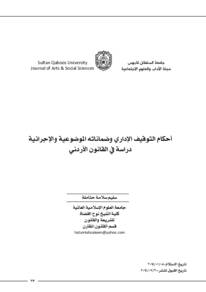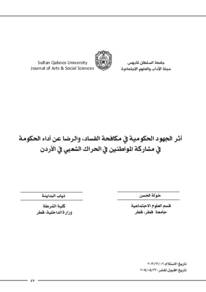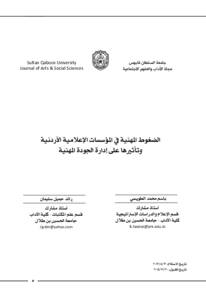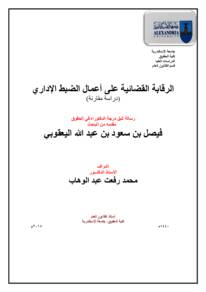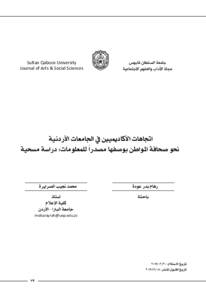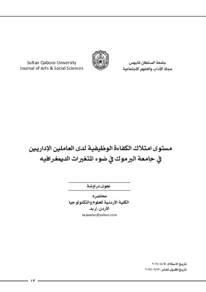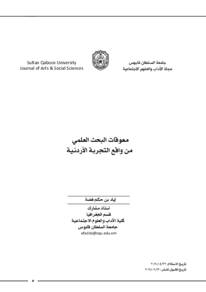Document
أحكام التوقيف الإداري وضماناته الموضوعية والإجرائية دراسة في القانون الأردني.
Publisher
جامعة السلطان قابوس. كلية الآداب والعلوم الاجتماعية
Gregorian
2015
Language
Arabic
English abstract
Personal freedom is the essence of human life. It is not created by legislation or laws. It is rather regulated by laws to reconcile its various aspects and achieve the common good of the community. It, therefore, does not accept restrictions except those that are necessary. The freedom of people should always be maintained; it is not permissible to arrest or detain any person except in accordance with the law. Accordingly, the Jordanian legislator was keen to put in place the procedural rules of administrative detention in terms of setting clear conditions for the practice of this detention and the reasons for resorting to it in order to reduce the abuse of this exercise by the authorities and to reduce the vulnerability of individuals at risk of such a practice. It is well-known that these actions result in a restriction of personal freedom but also it is known that these measures are aimed to protect society from risks. Detainees in this type of arrest are taken without trial, and it is exercised by the executive authority under the powers granted to it by the law. If all these precautions are meant to protect personal freedom and maintain its integrity, then how can the executive authority intervene in personal freedom and exercise maximum restrictions on it and tries to repeal it, given that this type of arrest is essentially a precautionary punitive measure? However, in this sense, it is in stark violation of the principle of legality of crimes and punishments, and it violates constitutional and legal warrantees. Despite all these principles about the sanctity of personal freedoms and the warrantees against excessive use of executive detention, it should be acknowledged that it is sometimes necessary for authorities to administer such a measure. This perplexing situation makes us endeavor to study the provisions and terms governing this kind of arrest and investigate its reasons, in an attempt to state the legal basis that calls for its justification. The study also addresses the main principles governing the behavior of authorities while exercising this detention and the main effects of such a practice.
Member of
ISSN
2312-1270
Resource URL
Citation
حتاملة، سليم سلامة (2015). أحكام التوقيف الإداري وضماناته الموضوعية والإجرائية دراسة في القانون الأردني. مجلة كلية الآداب والعلوم الاجتماعية، 6 (3)، 75-96.
Arabic abstract
الحرية الشخصية هي ملاك الحياة الإنسانية كلها، فلا تخلقها الشرائع بل تنظمها، ولا توجدها القوانين بل توفق بين شتى مناحيها وذلك تحقيقا للخير المشترك للجماعة، ورعاية للصالح العام. وبالتالي فهي لا تقبل من القيود إلا ما كان هادفا إلى هذه الغاية، وعليه فإن حرية الأشخاص مكفولة، فلا يجوز القبض على أي إنسان أو حبسه إلا وفقا للقانون. وبناء عليه حرصت التشريعات الأردنية على وضع القواعد الإجرائية للتوقيف الإداري من حيث وضع الشروط الكفيلة لممارسته وبيان أسباب اللجوء إليه بغية الحد من إساءة استعمال الإدارة لسلطتها بحيث تقلل من تعرض الأفراد لخطر اللجوء إليه. ومن المعلوم أن تلك الإجراءات ينتج عنها تقييد للحرية الشخصية للموقوف إذا علمنا أنها من الإجراءات الوقائية الهادفة إلى حماية المجتمع من المخاطر التي تتخذ دون محاكمة، وتمارسه السلطة التنفيذية بموجب الصلاحيات التي منحها لها القانون. فإذا كانت هذه هي الحرية الشخصية، وهذه هي ضماناتها، فكيف يمكن للسلطة التنفيذية أن تتدخل في الحرية الشخصية وتباشر أقصى القيود عليها، وتعمل على إلغائها، مع أن التوقيف في جوهره هو تدبير احترازي يحمل معنى العقوبة؛ ومع أنه بهذا المعنى يعتبر إجراءً مخالفًا لمبدأ شرعية الجرائم والعقوبات، ويخالف الضمانات الدستورية والقانونية. ومع كل هذه الضمانات، وبالرغم من كل المبادئ التي قيلت عن قدسية الحريات الشخصية، فإن الواقع يفرض نفسه على الإدارة في الدولة ويدعوها لمباشرة هذا الإجراء في بعض الظروف والحالات. مما دعانا إلى البحث في الأحكام الناظمة للتوقيف الإداري من حيث بيان مفهومه، كما بحثنا أسباب التوقيف موضحين الطبيعة القانونية له ومبررات القيام به، ثم تعرضنا لبيان أهم المبادئ التي تحكم عمل الإدارة أثناء ممارسته، وما هي أهم الضمانات الإجرائية الواجب الالتزام بها، والآثار الناتجة عن قرار التوقيف.
Category
Journal articles

